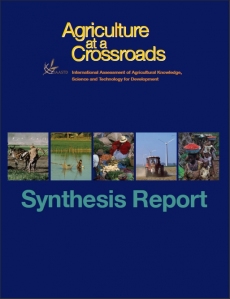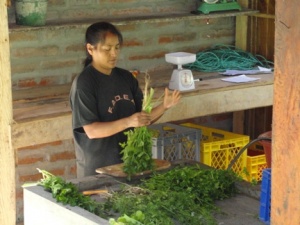(Reprinted with permission from – and copyright by – Groundswell International)
In the Andes, there have been fundamental changes in production patterns as a result of the different processes of land reform in the region and “agricultural modernization.” Today, the environmental context and local culture are no longer the main determinants of production systems, but rather the habits of unknown consumers and their food demands are determining what farmers grow and when and how they grow it. This has shaped current production systems, usually characterized by monoculture, total farm mechanization and dependence on agrochemicals to offset their ecological ill effects.
 The 2009 International Assessment of Agricultural Knowledge, Science and Technology for Development (IAASTD) questions common assumptions about the link between agricultural production and economic welfare and family nutrition, and provides evidence that externally driven systems – such as those that have increasingly displaced traditional systems in the Andes – often result in unfair prices, social inequality and environmental degradation. The report calls attention to proposals that allow us to overcome our conceptual barriers with respect to production and supply, consumers and producers, urban and rural populations, and the circulation and exchange of goods.
The 2009 International Assessment of Agricultural Knowledge, Science and Technology for Development (IAASTD) questions common assumptions about the link between agricultural production and economic welfare and family nutrition, and provides evidence that externally driven systems – such as those that have increasingly displaced traditional systems in the Andes – often result in unfair prices, social inequality and environmental degradation. The report calls attention to proposals that allow us to overcome our conceptual barriers with respect to production and supply, consumers and producers, urban and rural populations, and the circulation and exchange of goods.
Ekorural, Groundswell’s partner in the Andes, recently completed its own research on food systems in the Andes, which confirms the important influence consumers have on agricultural production systems and indirectly on the well-being of rural families. On account of these findings, Ekorural’s work now operates based on the underlying assumption: In order to transform Andean agricultural systems to be more productive, equitable and sustainable, we must not only look at rural areas and agriculture but also at urban areas, because consumers drive agricultural development.

During the past two years, Ekorural has identified, aligned itself with and committed to supporting unconventional initiatives, such as Canastas Comunitarias, that have developed around the theme of healthy food and people through the alternative circulation of agricultural products. The Canastas and other similar short-circuit food initiatives, under which you might find country fairs, CSAs, farm shops, community food baskets, etc., are a great opportunity to transform agriculture, heal the environment and live healthier lives.
People are the decisive factor for agriculture and represent an opportunity for change. What people buy and where they buy it strengthens different types of agricultural chains, and influences how healthy (or unhealthy) the agricultural system is. Follow Ekorural’s lead, support your local family farmers!
Learn more about Ekorural and Canastas Comunitarias.
